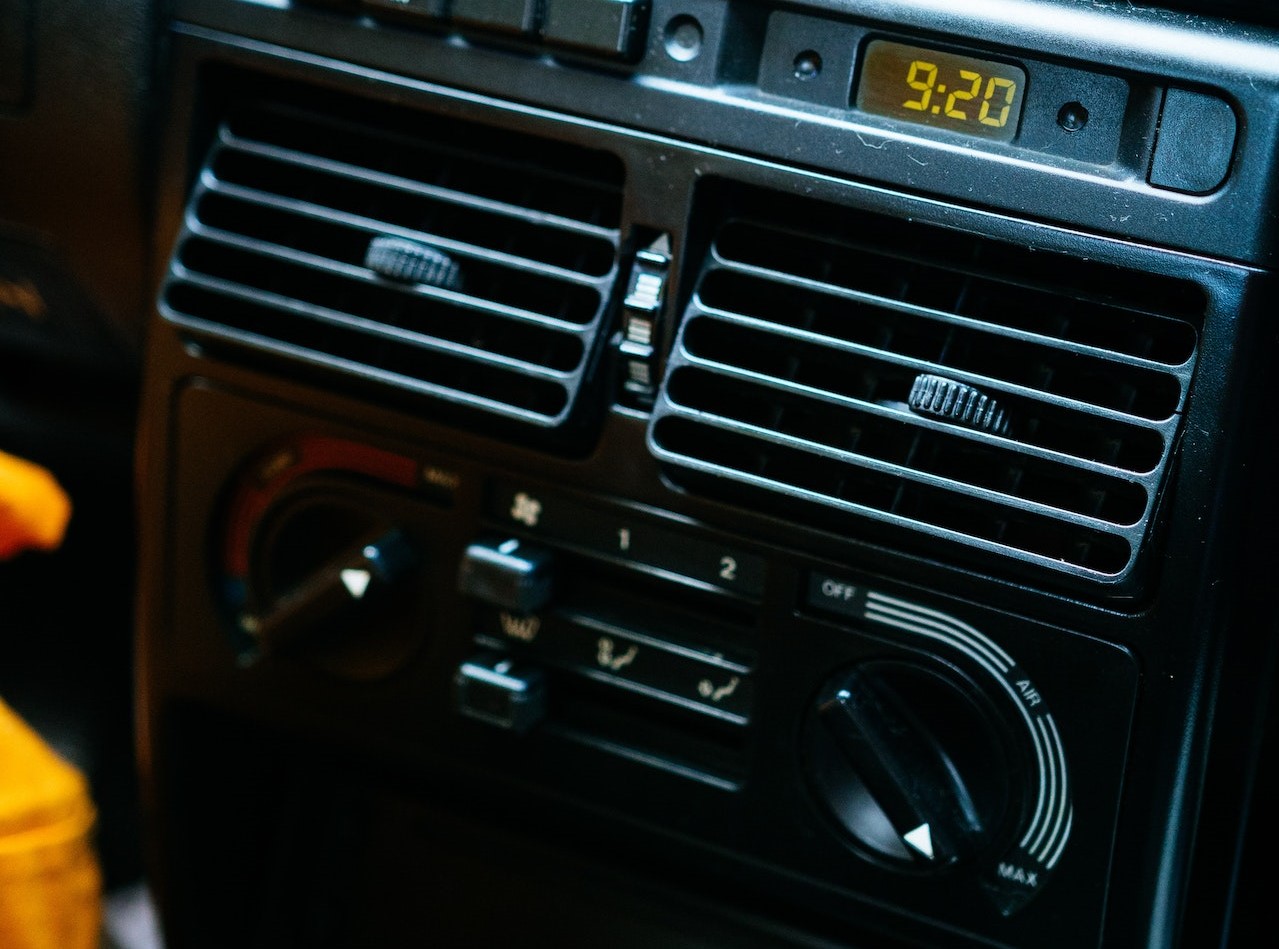September 2, 2025
What Could Be Wrong with Your Car’s A/C?

Photo by Athena under Pexels License
Nobody wants to drive around their car sweating like a pig, especially on a hot summer day.
Imagine being on a long road trip to another city and your car’s A/C suddenly starts blowing hot air, with the temperature quickly reaching 150 degrees. And you still got two hours before arriving at your destination! Now that’s going to be one hell of a ride (no pun intended).
So, what might be the problem? What could cause your air conditioner to blow warm air all of a sudden? That’s what we’ll find out here.
It’s essential to identify the issue so you can troubleshoot the unit yourself. That way, you can try to fix it before taking it to your local mechanic.
Could It Be a Refrigerant Leak?
Refrigerant is the lifeblood of your car’s air conditioning system. It absorbs heat from the cabin and releases it outside, keeping your vehicle cool. If there isn’t enough refrigerant circulating, the system can’t function properly, and you’ll feel the heat inside.
Leaks are a common cause of low refrigerant levels. They often occur due to worn hoses, corroded evaporators, or loose connections. Unfortunately, refrigerant leaks are notoriously hard to detect because the fluid evaporates when it escapes.
If you suspect a leak, you may notice that the A/C works well for a while after being serviced but then starts blowing warm air again. Temporary fixes like recharge kits are available, but they often don’t solve the root problem. For a lasting solution, you’ll need a professional repair shop to locate and seal the leak, then refill the refrigerant to the proper level.
Is the Compressor Not Working Properly?
The compressor acts as the heart of your car’s A/C system. It circulates refrigerant between the evaporator and condenser, keeping the system running smoothly. If the compressor fails, refrigerant can’t move and the air blowing through your vents won’t be cooled.
Compressor problems are often linked to inactivity. During colder months, many drivers rarely use their A/C systems. Unfortunately, letting the compressor sit idle for too long can cause it to seize up when you finally turn it on again.
Preventing compressor issues can be as simple as running your A/C for a few minutes every couple of weeks during the winter. This keeps the system lubricated and ready to go when the summer heat returns. If your compressor has already failed, however, professional repair or replacement will be necessary.
Is the Condenser Blocked or Broken?
The condenser plays a vital role in cooling refrigerant after it has absorbed heat from inside the vehicle. It sits at the front of the car, just behind the grille, which means it’s exposed to everything on the road.
A blocked condenser is one of the easier problems to identify. If you pop the hood and see leaves, dirt, or other debris clogging the condenser, that buildup could be preventing proper cooling. Cleaning it off may solve the issue.
If the condenser is broken or leaking, the only option is replacement. Signs of a failing condenser include visible damage or oily residue around the component. Because the condenser is so critical to the system, ignoring this issue will almost always result in warm air blowing from your vents.
Are the Cooling Fans Damaged or Not Running?
Cooling fans help keep the condenser at the right temperature by drawing air across it. If these fans are damaged or not running, the system won’t be able to release heat properly.
Symptoms of faulty fans can include unusual noises when the A/C is running, cracks in the blades, or no movement at all. Electrical issues such as blown fuses or damaged wiring can also stop the fans from turning.
In some cases, you may be able to handle minor fixes yourself, such as replacing a blown fuse. However, if the fans are broken or the motor is burned out, you’ll need professional help to repair or replace them.
Could There Be an Electrical Problem?
Your car’s A/C system relies on a network of wires, relays, and sensors to function. If there’s an electrical issue, the system may stop working altogether.
Signs of an electrical failure include an unresponsive A/C system, intermittent cooling, or fuses that keep blowing. A quick visual inspection might reveal broken, frayed, or disconnected wires.
While you can replace a blown fuse yourself, electrical problems often run deeper than they appear. In most cases, it’s best to call a professional to pinpoint the problem and perform a safe, lasting repair.
Can I Troubleshoot the A/C System Myself?
Before paying for a repair, you can do some basic troubleshooting on your own. Here are a few practical steps to take:
- Check refrigerant levels with a recharge kit (but remember, low refrigerant often signals a leak).
- Inspect the condenser for visible debris and carefully clean it.
- Look at the cooling fans while the A/C is on to make sure they’re spinning.
- Examine fuses and wiring for signs of damage.
You may need basic tools like a socket set, screwdrivers, and safety goggles. Always put safety first – never attempt repairs you’re not confident in handling and avoid opening pressurized parts of the A/C system.
When Should I See a Professional?
Sometimes, DIY troubleshooting isn’t enough. Certain red flags mean you should go straight to a repair shop. These include:
- Strange noises like grinding, squealing, or rattling when the A/C is on
- Refrigerant leaks that keep coming back after a recharge
- Electrical issues that cause repeated fuse failures
- Warm air even after you’ve cleaned the condenser and checked the fans
Professional repair shops have specialized tools to detect leaks, test electrical systems, and replace major components like compressors. Choosing a trusted shop means you’ll get an accurate diagnosis and a reliable fix, saving you time and frustration in the long run.
How Can I Prevent My Car A/C From Blowing Hot Air Again?
Once your A/C is repaired, you’ll want to keep it in good shape. Fortunately, regular maintenance goes a long way. Here are a few habits that help:
- Run your A/C for a few minutes at least once every couple of weeks year-round, even in the winter.
- Check refrigerant levels and system performance during routine vehicle maintenance.
- Keep the area around the condenser clean and free of debris.
- Pay attention to unusual noises, smells, or performance issues, and address them early.
By building these habits into your routine, you’ll extend the life of your system and minimize the risk of future issues.
Want to Get Rid of That Old Car Instead?
If your A/C is just one of many problems and your vehicle is costing more in repairs than it’s worth, you may be ready to move on. Instead of putting more money into a car that keeps giving you trouble, consider donating it to Veteran Car Donations.
When you make this gift, you enjoy a hassle-free process: We accept working and non-working vehicles, handle all the paperwork, and provide free towing. You may also qualify for a top tax deduction.
Most importantly, your donation helps fund programs that support struggling veterans across the country. From housing to healthcare to employment assistance, your old car can do more than take up space – it can provide real help to our nation’s heroes.
Ready to make a difference? Visit VeteranCarDonations.org today to start the donation process and turn your old vehicle into lasting support for veterans.
Support Our Hurting Heroes Today!

Photo by Sharefaith under Pexels License
That old commuter car lying dormant in your garage is worth so much more than you think. Hand it over to Veteran Car Donations and we’ll use it to transform the lives of the hurting heroes in your community. Call us at 877-594-5822 or fill out our online donation form now!
